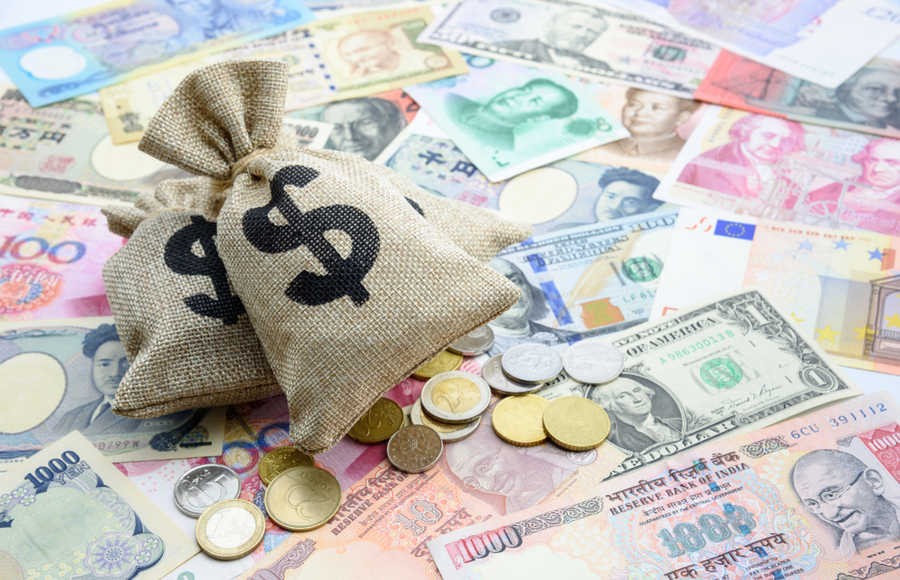I WANT
RELATED LINKS
I WANT
RELATED LINKS
RELATES LINKS
I WANT
RELATES LINKS
Services
Related Links
Use and Management of Cookies
We use cookies and other similar technologies on our website to enhance your browsing experience. For more information, please visit our Cookies Notice.
- Personal Banking
- Stories & Tips
- Grow Your Wealth
- Opening up the World to Overseas Investment
- Personal Banking
- ...
- Opening up the World to Overseas Investment
Opening up the World to Overseas Investment
14-01-2022
In each period of time and each economic cycle, there’s no asset that brings remarkable performance or wins the market at all times. That’s why the most important thing to arrange an investment portfolio is ‘Asset Allocation’ or to diversify investment to a variety of classes and regions depending on acceptable risk level because that’s a good choice for investors.
Referring to the global market statistics as of December 2020 from Bloomberg and Business Insider, the value of global capital markets is about US$80 trillion in 60 global indexes which over 40% are in the U.S., followed by Japan and China valued at 7.6% and 7.5%, respectively. On the other hand, the size of Thai stock is minimally only 1% of global stock value.
Therefore, there’re plenty of choices and more opportunities in investment overseas so investors are able to better manage the benefits of the portfolio including risk.
Alternatives for overseas investment
- Direct investment: That is to establish a business overseas or import products to foreign countries. This choice may be suitable for expert entrepreneurs or those who have a chance to build a business in foreign markets with a high investment budget. Thus, it doesn’t work for retail investors with a limited budget.
- Direct investment through the overseas stock market: Investment in financial assets in overseas markets is no longer complicated. Most brokers start servicing an opening of investment portfolio overseas so the foreign investment is more prevailing. Moreover, investors can catch up on news and easily make a self-analysis in investment by searching information from several media including critics from service brokers.
- Foreign Investment Fund (FIF): It’s a Mutual Fund that focuses on foreign asset investment not exceed than 80% of Net Asset Value. FIF is an ideal investment for novice investors, busy investors, and those without experience in foreign investors who need support from Fund Manager.
Investment type and policy of overseas Mutual Fund
Currently, the overseas Mutual Fund in Thailand is divided into 2 major types.
- Asset Management Company makes a self-managed fund: Taking money to directly invest in assets or financial products in foreign markets; for example, stocks, bonds or derivatives such as Mutual Fund invested in South Korea bonds, foreign Mutual Funds invested in Vietnam, etc.
- Asset Management Company buys Mutual Fund managed by foreign Fund Manager, or directly invests through overseas Mutual Fund: Investment can be done in 2 categories:
- Fund of Funds Mutual Fund: Taking money to buy a variety of overseas Mutual Funds under a similar or different policy. The Asset Management Company will take the lead whether which type of fund and ratio amount should be invested, and investment can be adjusted regarding The Securities and Exchange Commission criteria.
- Feeder Fund Mutual Fund: Taking money to invest in only one overseas Mutual Fund which is called ‘Master Fund’ such as, X fund invested in Y fund which is set up in a single foreign fund, and Y fund is managed by a foreign Fund Manager. An example of the Feeder Fund is an overseas Mutual Fund invested in other overseas Mutual Fund which has an investment policy in technology.

How attractive is the overseas Mutual Fund?
It’s an opportunity for retail investors to invest abroad with affordable money and investment will be managed by an expert. As a result, investors can allocate investment across multi-financial products which cover more products sold in the country and help diversify investment risk.
There’re numerous investment alternatives because the investment policies of overseas Mutual Fund vary; for example, overseas General Fixed Income Fund, overseas Stock Mutual Fund, Common Commodity Fund such as Gold Fund.
Some funds focus on investment in certain global regions, specifically emerging market segments with high growth potential such as the BRIC group (Brazil, Russia, India, China), while some funds choose to invest in the public utility business, alternative energy, pharmaceutical, and medical supply industry, or advanced innovation that hasn’t yet been launched in Thailand.
What are the risks of overseas investment?
Investors should study risk factors of overseas investment before making the decision as follows.
Asset Investment Risk: For example, stocks carry risk due to their price fluctuation in the market while for bonds, the issuer takes a risk in an ability to pay off debts, or liquidity risk when investing through Mutual Fund. Investors should consider if that Mutual Fund is invested in government or private bonds, and also check the credit rating of bonds and their assets.
Country Risk: This risk may happen because of changes in policy, politics, or economic fluctuations of that country.
Repatriation Risk: This risk may obstruct investors to bring back investing money and benefits to their home country as fully expected.
Foreign Exchange Rate Risk: The change in the foreign exchange rate affects investment value and investors may lose their principals once an exchange rate is diverted to domestic currency at the rate on processing date according to market movement. Investors should consider whether the investment in foreign currency is suitable for them by realizing investment objectives, financial status, and their acceptable risk level.

Channels of overseas investment
At present, investors are able to invest in an abundant way and split choices into two types including Indirect Investment and Direct Investment.
Indirect Investment is a form of investment through Mutual Funds that Asset Management Companies select attractive overseas investments for investors. Alternatively, investors can call for service from Private Fund and set a policy for that intermediary institution to invest abroad. Retail investors may invest through Robo-Advisor whose portfolio is arranged by acceptable risk level, using minimum financial investment less than Private Fund; however, some institutions don’t even require minimum investment so investment startup is easier.
Direct Investment can now be done more conveniently such as buying stocks or funds directly. Investors can exchange the currency that they need and make direct investments through applications or systems from service providers. Moreover, it’s much easier to open an investment account through smartphone transactions which are key to supporting new investments.
After all, there’s a large number of asset investments abroad which helps diversify risks and minimize fluctuations in the investment portfolio. Anyway, investment comes with concerning factors like currency value, fees, and more risks than investment in Thailand. Therefore, investors should profoundly study investment details, products, and risks in order to make the best investment decision.
SCB Securities Co., Ltd. (SCBS) offers an array of overseas investments. Interested investors can download EASY INVEST application, and start an investment right now!
Nipaphan Poonsathiensap CFP®, ACC
Freelance Financial Planner, Writer, and Lecturer
